Expert Grooming Tips
“When I first brought home my Persian kitten, I was terrified of grooming her!” laughs Maria, a longtime member of our Tailwaggors family. “Now, our grooming sessions are like a special bonding time where we both get to relax and enjoy each other’s company.”
Like Maria, many Persian cat parents feel overwhelmed at first. Those gorgeous, flowing coats that make Persian cats so special do need regular care – but don’t worry! Regular grooming not only keeps their coat beautiful but also prevents skin infections and reduces shedding, contributing to their overall health and happiness.
To learn more about Persian cats and what makes them so unique, check out our Ultimate Guide to the Persian Cat.
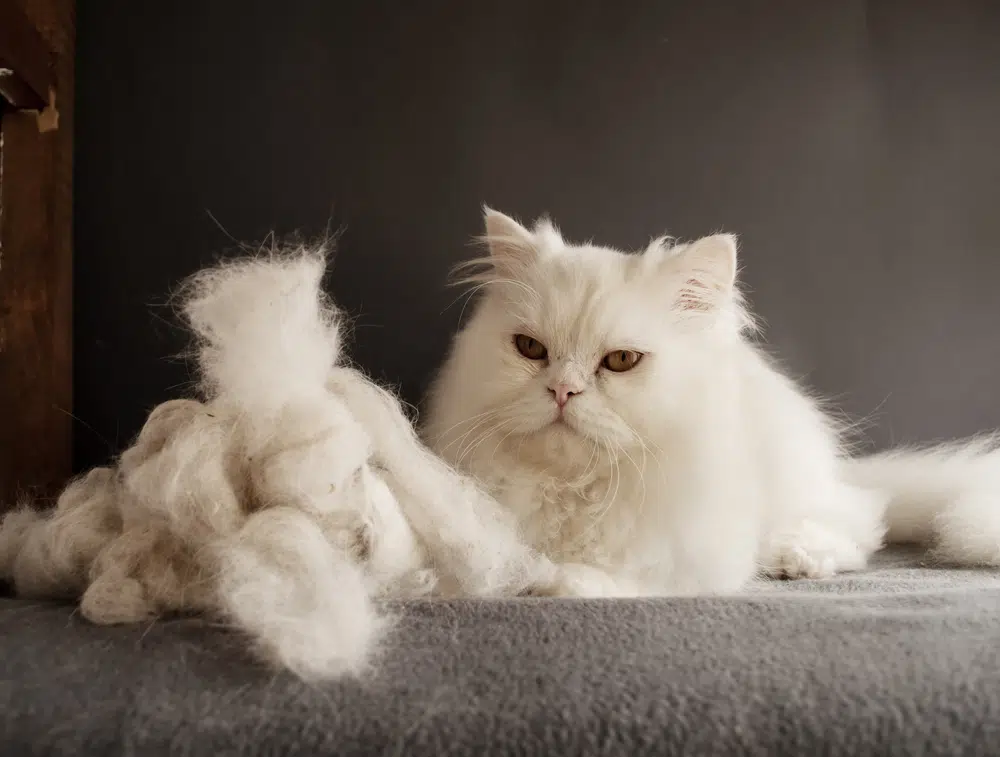
Why Your Persian’s Coat Needs Special Care
Think of your Persian’s coat like a ‘delicate silk dress‘ – beautiful but needing gentle handling! Their unique double-layer coat has:
- A soft, fluffy undercoat that keeps them warm
- Long, silky guard hairs that protect them
- Fur that can grow up to 15-20 cm (6-8 inches) long
During grooming, take the opportunity to check for skin redness, bumps, or bald patches. These could be early signs of dermatitis, parasites, or fungal infections that may require veterinary attention.
Dr. Esther Knoetze, our small animal veterinarian, explains: “A Persian’s coat can mat within 24-48 hours if not maintained. These mats aren’t just unsightly – they can hurt your cat and lead to skin problems.”
- • Gently part your cat’s fur
- • You should be able to see their skin
- • If you can’t, you need to brush more thoroughly
When caring for such a delicate breed, it’s also essential to cat-proof your home. Check out our Complete Guide to Cat-Proofing Your Home.

Your Essential Persian Cat Grooming Kit
“The right tools make all the difference!” shares David, who’s been grooming his Persian cat for five years. “I learned this the hard way after wasting money on cheaper brushes that just didn’t work.”
Wide-toothed Metal Comb
- Why you need it: Gets right to the skin to prevent mats
- Look for: 4-6 mm tooth spacing
- Pro tip: Stainless steel prevents static
“A good comb also helps you detect fleas or ticks. Look for flea dirt (small black specs) at the base of the fur while combing.” – Dr. Esther Knoetze, BVSc.

Stainless Steel Pet Grooming Comb Set – Wide, Dense & Flea Tooth Combs (3 pack)
Made with premium stainless steel, round and gentle teeth for scratch proof, very durable and smooth. Effectively remove loose hair, dander & dirt trapped beneath fur.
Slicker Brush
- Why you need it: Removes loose fur and prevents shedding
- Look for: Flexible bristles with rounded tips
- Pro tip: “Always brush in the direction of hair growth,” advises professional groomer Lisa Chen
💡 Money-Saving Tip: “Start with these two tools – they’ll handle about 80% of your grooming needs,” recommends Dr. Emma Lee.

Hertzko Self-Cleaning Dog & Cat Slicker Brush
This brush gently removes loose hair and eliminates tangles, knots, dander, and trapped dirt. It features a comfortable grip and a self-cleaning function for easy maintenance.
Cat-Safe Shampoo
- Must be: pH balanced (6.5-7.5)
- Look for: Hypoallergenic formula
- Avoid: Human shampoos (they can disrupt your cat’s skin pH balance)
“Over-bathing can strip your Persian’s skin of natural oils, leading to dryness. Consult your veterinarian to determine the ideal bathing frequency based on your cat’s specific skin and coat condition.”
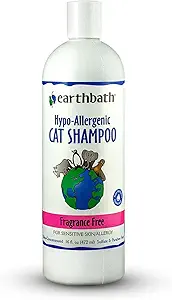
Hypoallergenic Cat Shampoo – Fragrance Free Cat Shampoo for Allergies and Itching, Made in USA
This fragrance-free, pH-balanced shampoo is designed for sensitive skin, ensuring a gentle and effective clean without irritating your cat’s skin.
Microfiber Towels (at least 2)
- Why: Quick-drying and gentle on the coat
- Pro tip: “Pat, don’t rub, to prevent tangles,” shares Maria
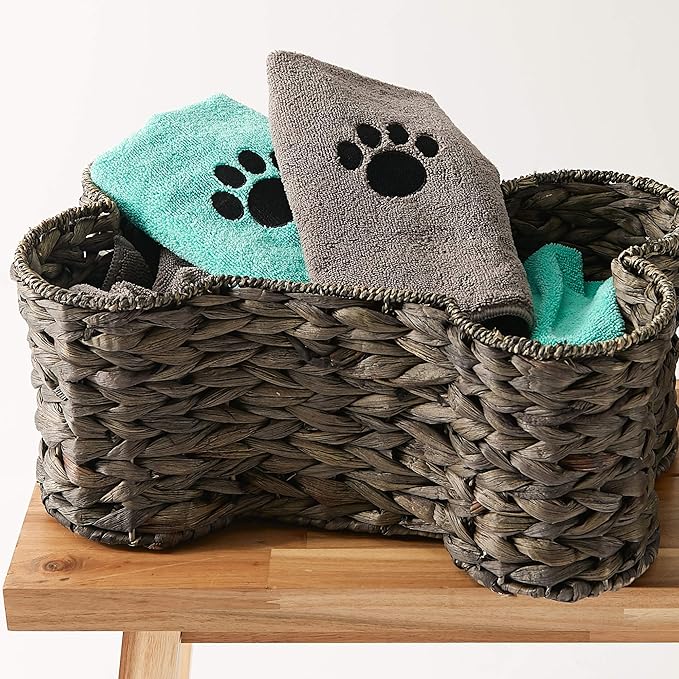
Bone Dry Pet Grooming Towel Collection Embroidered Absorbent Microfiber Drying Set, 15×30,
These absorbent microfiber towels are perfect for drying your cat efficiently while being gentle on their coat.
Tear Stain Remover
- Type: Enzymatic formula
- When: Use daily for best results
Health Note: “If tear stains persist despite daily cleaning, consult your veterinarian to rule out blocked tear ducts or underlying eye conditions like conjunctivitis.”
Community tip: “Stainless steel bowls and filtered water helped reduce my Persian’s tear staining.” – Emma

I-LID ’N LASH Vet Pump Pet Tear Stain Remover
Uses hyaluronic acid to clean eyes, prevent tear stains, and reduce inflammation. Very gentle and safe for daily use. Hypoallergenic formula

HICC PET Eyes Wipes for Dogs & Cats – Gently Remove Tear Stain, Eye Debris, Discharge, Mucus Secretions
Setting Up Your Grooming Station
🏠 The Perfect Spot Needs:
- Good lighting (for skin checks)
- Non-slip surface
- Comfortable height (for you and your cat)
- Room temperature: 20-22°C (68-72°F)
- Treats within reach!
- Optional: Calming pheromone diffuser for anxious cats
For a complete list of must-have items for your cat, including grooming tools, explore our Vet-Approved New Cat Supply Checklist.

Daily Grooming: Making It Easy and Fun
Morning Quick-Groom (5-10 minutes)
Evening Deep-Groom (15-20 minutes)
Face and Head (3-5 minutes)
- • Thorough eye area cleaning
- • Behind-ear check
- • Check for ear debris
Body Grooming (10-12 minutes)
- • Work in sections
- • Start with easy areas
- • Leave tummy for last
- • Monitor for skin changes
Problem Areas (5-7 minutes)
- • Behind ears (check for mites)
- • Under armpits (watch for irritation)
- • Base of tail (check for flea dirt)
🌟 Health Tip: “Starting the day with a short grooming session can help you spot early signs of matting or skin irritation before they become problematic.” – Dr. Esther Knoetze (BSc)(BVSc)
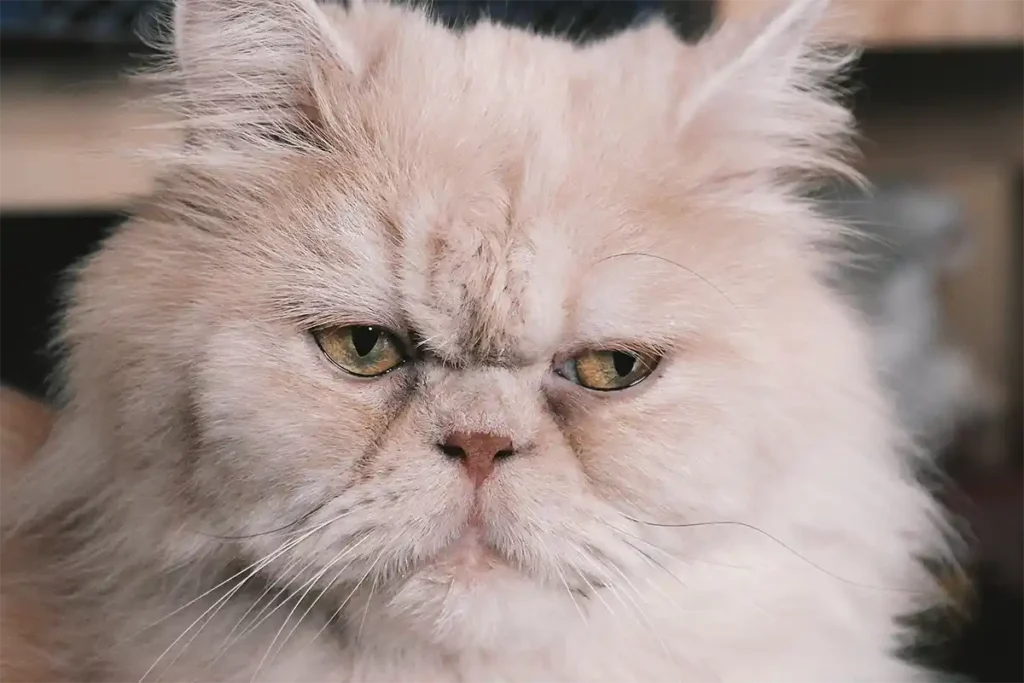
Tackling Common Grooming Challenges
Dealing with Tear Stains
🔬 The Science Bit
Ever wonder why those reddish-brown marks appear? They happen when natural molecules in tears (called porphyrins) meet air. Persian cats often get them because of their adorable flat faces.
Morning Care
Evening Care
👨⚕️ Veterinary Insight: “A high-quality diet free of artificial dyes and rich in omega-3s can help reduce tear staining over time by supporting overall skin health. However, sudden changes in tear staining can indicate an underlying health issue.” – Dr. Esther Knoetze
🔬 The Science Bit: Ever wonder why those reddish-brown marks appear? They happen when natural molecules in tears (called porphyrins) meet air. Persian cats often get them because of their adorable flat faces. Tear staining is a common issue in Persian cats, but it can be effectively managed with proper cleaning and care—learn more in our Comprehensive Guide to Persian Cat Tear Stains: Causes, Treatments, and Prevention.
Battling the Dreaded Mats
💡 Expert Insight:
“Don’t feel bad if you find mats – they happen to even the most dedicated Persian parents! However, preventing them is crucial as severe mats can lead to skin infections.”
– Dr. Esther Knoetze
Mat Danger Zones (Monitor Daily)
Dealing with Mats Safely
For Small Tangles
- • Spritz with detangling spray
- • Wait 2-3 minutes
- • Gently separate with fingers
- • Work through with comb
- • Check skin underneath
For Stubborn Mats
- • Use mat splitter (₤10-25 / $15-35 / €12-30)
- • Work from edges inward
- • Take frequent breaks
- • Never pull or tug
- • Monitor skin for redness
⛔ Medical Alert – Never:
- • Cut mats close to skin (risk of cuts)
- • Use regular scissors (emergency vet visits are costly!)
- • Force a comb through (can cause skin trauma)
- • Ignore matting (can lead to infections)
Managing Shedding Season
Health-Conscious Shedding Solutions
💡 Expert Insight:
“Persians shed year-round, but spring and fall are the big shows! These seasonal changes are normal, but excessive shedding can indicate health issues.”
– Dr. Esther Knoetze
Prevention Strategies
Clean-up Solutions
🏥 When to Call the Vet
- • Sudden increase in shedding
- • Patches of hair loss
- • Red or irritated skin
- • Excessive scratching
“If you ever notice skin irritation or unexpected injuries, consult our Veterinarian’s Complete Cat Emergency Guide for critical care tips.”
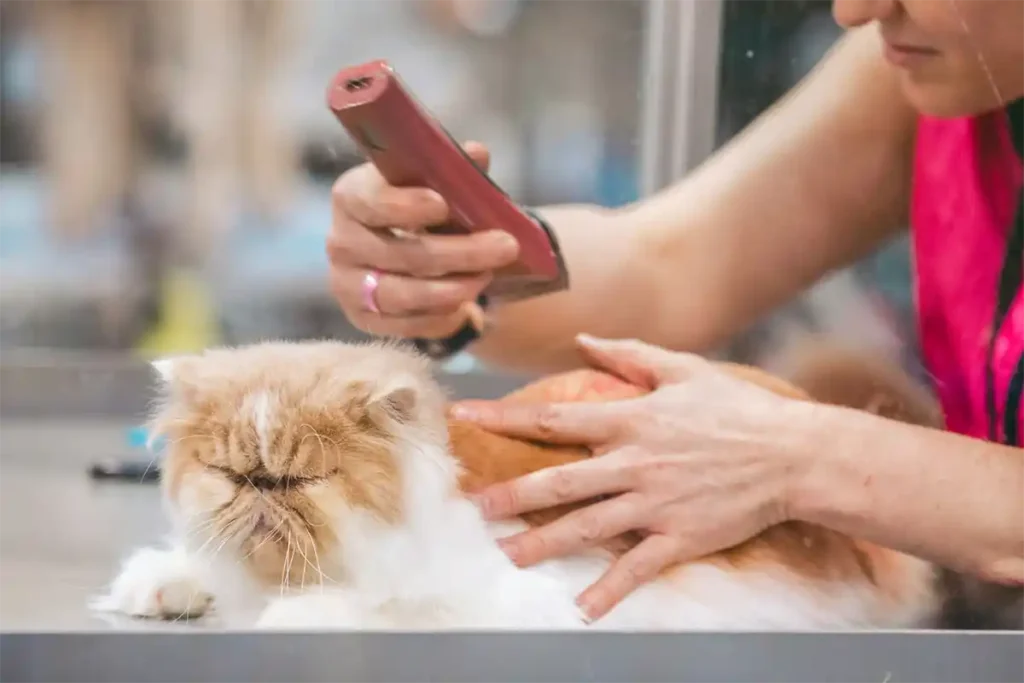
Professional Grooming & Health Checks
Signs It’s Time for Expert Help
👨⚕️ Veterinary Note: “If you notice persistent dandruff, thinning fur, or scabs, schedule a veterinary check-up to rule out underlying issues like allergies or fungal infections before proceeding with grooming.”
Professional Service Expectations
Must-Have Qualifications

Seasonal Grooming Adaptations
Summer Care (20-30°C / 68-86°F) ☀️
⚠️ Health Alert: “During hot weather, keep grooming sessions short to avoid overheating. Watch for rapid breathing or lethargy, which can be signs of heat stress. Groom in a well-ventilated, cool area.” – Dr. Esther Knoetze
Summer-Specific Health Checks
Skin Monitoring
- • Check for sunburn
- • Watch for hot spots
- • Monitor for flea activity
- • Look for seasonal allergies
Cooling Strategies
- • Air-conditioned grooming space
- • Morning or evening sessions
- • Hydration breaks
- • Cool towel availability
Winter Care (15-20°C / 59-68°F) ❄️
❄️ Veterinary Tip: “A humidifier can help combat dry air during winter, keeping your cat’s skin hydrated and comfortable. This reduces the risk of skin issues and static electricity in their coat.”
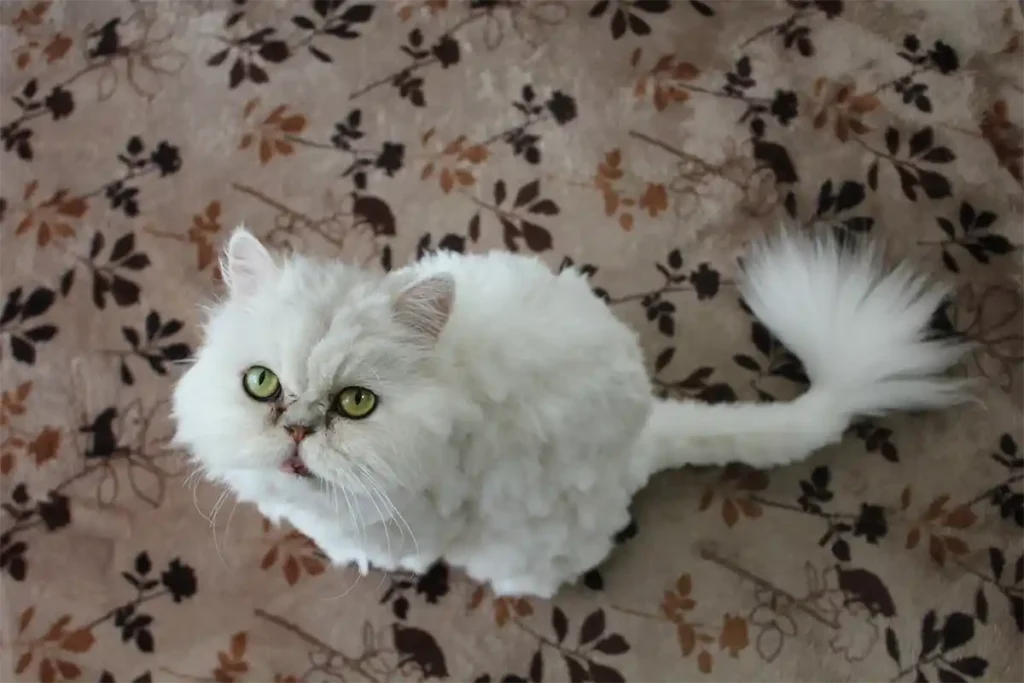
Emergency Grooming Situations: Quick Action Guide
When Things Go Wrong
🚨 Common Emergencies & Professional Solutions
Got Something Sticky in the Fur?
🚨 Medical Alert: “Toxic substances like paint or glue can be harmful if licked. Cover the affected area temporarily and transport your cat to the vet immediately for treatment.”
Found a Huge Mat?
Emergency Kit Essentials 🧰
Frequently Asked Questions About Persian Grooming
When it comes to grooming Persian cats, every pet parent has questions. After all, their luxurious coats and unique needs make them one of the most elegant yet demanding feline companions. To help you care for your Persian in the best way possible, we’ve answered four of the most frequently asked grooming questions.
Whether you’re wondering about brushing techniques, dealing with tear stains, or choosing the right tools, we’re here to guide you with trusted advice and practical tips. Let’s dive in and unravel the secrets to keeping your Persian cat looking and feeling their best!
Help! My Persian Hates Grooming!
+This is a super common concern among Persian cat owners. Here’s our vet-approved approach to make grooming a positive experience:
- Start with 2-minute sessions
- Offer high-value treats
- Give lots of praise
- Stop before your cat gets upset
- Use veterinary-approved calming aids if needed
🩺 Veterinary Insight:
“Building positive associations with grooming takes time. Consistency and patience are key to helping your Persian accept and even enjoy grooming sessions.” – Dr. Esther Knoetze, BSc, BVSc
How Much Time Should I Really Spend Grooming?
+Here are the real-world time commitments that provide the best health benefits:
- Quick morning session: 5-10 minutes (includes health check)
- Evening session: 15-20 minutes (detailed skin examination)
- Full groom (with bath): 60-120 minutes (monthly health assessment)
- Professional visit: 2-3 hours (includes health screening)
🐾 Tailwaggors Tip:
Break longer sessions into smaller chunks if your cat gets restless. The key is consistency rather than duration.
What’s the Right Way to Bathe My Persian?
+Preparation is key! Here’s what you need:
- Water temperature: 37-38°C (98-100°F)
- All supplies within reach
- Non-slip mat in place
- Towels ready
- First aid kit nearby
During the bath:
- Use lukewarm water
- Keep face dry
- Rinse thoroughly
- Support your cat always
- Monitor for stress signs
🩺 Veterinary Insight:
“Always test the water temperature on your wrist first, just as you would for a baby. The right temperature helps keep your Persian calm during bathing.” – Dr. Esther Knoetze, BSc, BVSc
How Do I Know If I’m Doing It Right?
+Look for these health and grooming success signs:
- No visible mats
- Healthy, clean skin
- Happy, relaxed cat
- Shiny, smooth coat
- Less shedding around house
- Normal appetite and behavior
- No skin irritations or redness
🐾 Tailwaggors Tip:
Take photos of your Persian’s coat regularly to track improvements and identify any areas that might need extra attention.
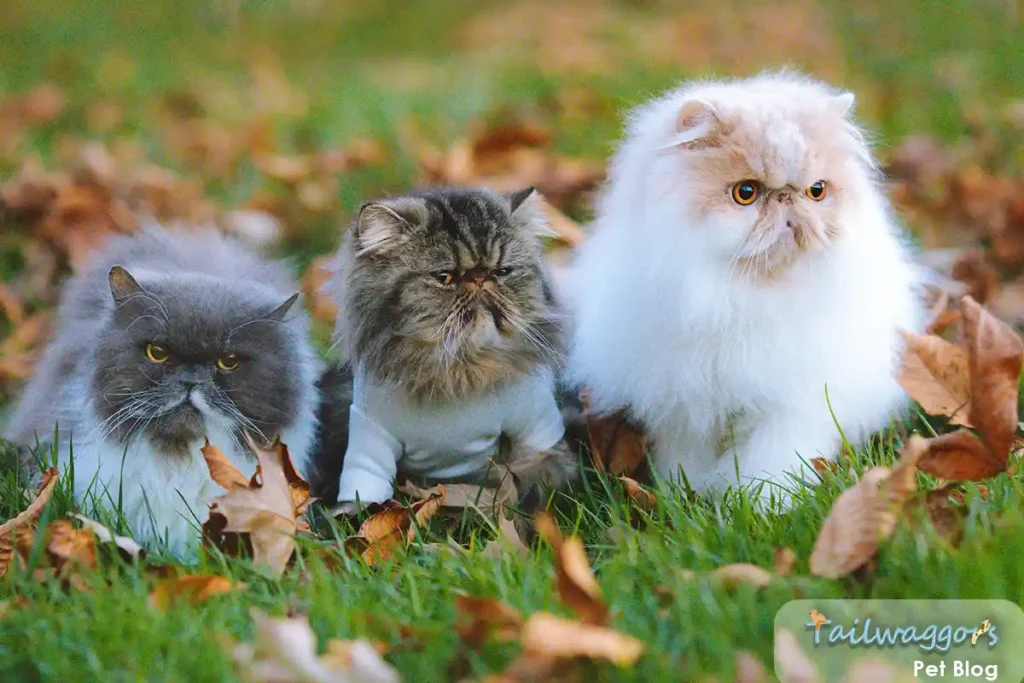
Your Persian Care Journey: Next Steps
Starting Out (First Month) 🌱
Growing Together (Months 2-3) 🌿
Becoming an Expert (Ongoing) 🌳
Final Words of Encouragement
Remember, proper grooming is more than just aesthetics – it’s a crucial part of your Persian’s health care routine. Your dedication to learning proper grooming shows how much you love your cat. Take it one day at a time, celebrate small victories, and know that our whole community, including our veterinary experts, is here to support you.
⭐ Your Next Steps:
- Go through our beginner’s checklist
- Start with just 5 minutes daily
- Share your journey with us! Contact Tailwaggors
🐾 Obsessed with Persian Cats? Us too! 🐱
Share this guide with your fellow Persian cat enthusiasts and help them uncover the secrets to keeping their feline friends looking fabulous and feeling great! 🧴✨
📩 Spread the purr-fect care tips today!











